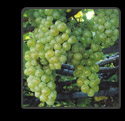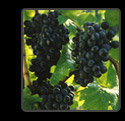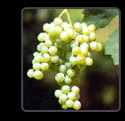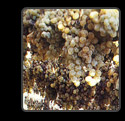




Vineyard
The locations of the vineyards in concert with the terrace cultivation - crossing the sides of the vesuvian profile - make it possible to expose the vines uniformly to the sun, from which derives the innate, extra-ordinary characteristics of these wines. In addition to the importance of the sun in Vigneti Sorrentino growing, the peculiarity of Lacryma and other productions resides in the exceptional ground characteristics. The Vesuvian region is the most extended vulcanic area in conti-nental Europe, if we count active explosive volcanoes, even dormant. Several grape varieties grow on this soil and Sorrentino’s company derived the best result from this huge choice. The vulcanic soil, amazingly soluble and sandy is - by its nature- impenetrable to parasites like the dreadful Fillossera (microscopic insects nurrishing on lymph, sucked from the roots of the plants). Thanks to these benefits, Sorrentino’s company succeded to realize, in this area, a natural reproduction of vines, without having recourse to auto-chthonous vine-grafting on Ameri-can, Fillossera-resistant plants. Acting like this, Paolo Sorrentino and his son Giuseppe managed to be innovative pioneers without negle-cting tradition, and realized lots of viticultural varieties always different and, at the same time, with the same exceptional quality. The crown jewel of the farm’s lands is Vigna Lapillo, one of the Vesuvius crater’s nearest estates, producing an inestimable-flavoured “cru”: the exclusive “Vigna Lapillo” Lacryma Christi. The geologic conformation of Vesuvian slopes, the rare characteristics of vulcanic soil and a marvellous microclimate make the Azienda Sorrentino’s territory one of Italy’s most interesting viticultural areas, with a traditional inclination and a great potential, not yet fully developed.
© Azienda Vinicola Sorrentino